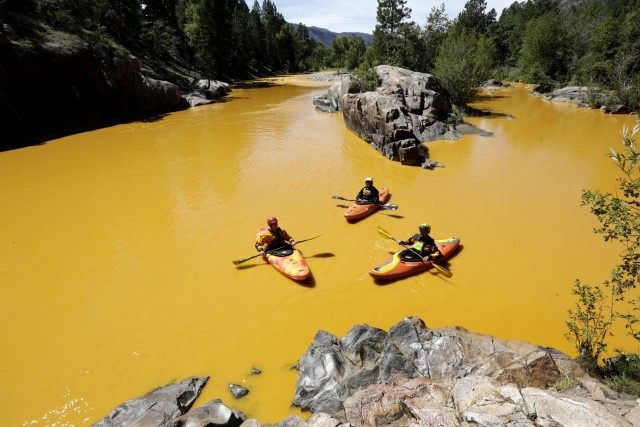Unless a federal judge issues a preliminary injunction, the definition of the “Waters of the U.S.” will change on August 28—giving the Environmental Protection Agency (EPA) the authority to regulate the water in your backyard.
Thirty-one states, in four districts, have filed motions with the federal courts to block the EPA and the U.S. Army Corps of Engineers (ACOE) from beginning to enforce the new “Waters of the U.S.” (WOTUS) rule, which represents a new interpretation of the Clean Water Act (CWA). The Federal Register calls the new rule “definitional” and states: “The rule will ensure protection for the nation’s public health and aquatic resources, and increase CWA program predictability and consistency by clarifying the scope of ‘waters of the United States’ protected under the Act.”
WOTUS was published in the Federal Register on June 29 and will become effective on August 28.
The interpretation is important. The CWA used to apply to “navigable waters,” to now, as Texas Attorney General Ken Paxton recently said: “include almost any piece of land that gets wet and puddles.”
Morrisey calls the rule “regulatory lunacy.” He’s hosted town-hall meetings where he’s heard from citizens concerned that “this rule would infringe on their property rights and force them to pay thousands of dollars to do basic work around their homes, farms and workplaces.” Morrisey adds: “This rule expands a scheme whereby property owners have to ask the EPA for permission to do yardwork.”
While the word “navigable” hasn’t been removed from CWA—as that would require an act of Congress—the EPA has expanded that definition to include any water that has a “significant nexus” with navigable waters. This is where water in your back yard could be impacted. Regarding the final rule, Paxton explains: it “is so broad and open to interpretation that everything from ditches and dry creek beds, to gullies, to isolated ponds formed after a big rain could be considered a ‘water of the United States.’”
The CWA’s single word, “navigable,” has, for decades, been contentious with those who want to expand government control and limit industrial activity such as oil-and-gas development, mining, ranching, and farming. Former Representative Jim Oberstar (D-MN) fought hard to have the word navigable removed from the CWA and to expand its control to any waters. Despite repeated bites at the apple, prior Congresses refused to pass his legislation.
EPA, once again, uses rulemaking to do what its proponents couldn’t do through legislation—a hallmark of the Obama administration.
A July 28, 2015, letter signed by officials from 31 states, sent to EPA and ACOE requesting a minimum nine-month extension of the WOTUS effective date, states: “the new regulation will also have a significant impact on agricultural, homebuilding, oil and gas and mining operations as they try to navigate between established state regulatory programs and the EPA’s and ACOE’s new burdensome and conflicting federal requirements. This uncertainty especially threatens those states that rely on revenues from industrial development to fund a wide variety of state programs for the benefit of their respective citizens.”
On August 11, thirteen states—including oil-and-gas “heavyweights,” as Natural Gas Intelligence (NGI) calls them, Alaska, Colorado, North Dakota, and New Mexico—became the latest to ask a federal judge to block the controversial rule from taking effect. The states have asked for a hearing on the motion during the week of August 24.
The lawsuit filed in the U.S. District Court for the Southern District of Georgia filed on June 28, on behalf of nine Southeastern states (now 11, including Indiana and North Carolina), received an expedited briefing. Oral arguments were heard on August 12. Morrisey’s office told me they are hopeful for a decision by August 28.
North Dakota’s Attorney General Wayne Stenehjem believes the states are entitled to an injunction “because implementation of the Rule will cause immediate and irreparable harm and deprive the States of the opportunity to present the merits of their case prior to this unprecedented jurisdictional over-reach taking effect.”
In addition to the 31 states, on July 2, a coalition of a dozen industry groups—from agriculture to manufacturers to mining—filed a complaint against the EPA and ACOE over the WOTUS rule.
The litigation seeks to delay or defeat the regulations before they go into effect.
Apparently, the EPA—which allowed millions of gallons of toxic waste to spill into the Animas River—and its “far-left environmental allies” believe the agency can do a better job of protecting waterways, streams, and wetlands than the states. A majority of states and industries disagree. The coalition hopes the lawsuits—which are expected to be combined into one—will overturn the rule and prove that the EPA has gone beyond its jurisdiction with this expansion of regulatory authority.
The author of Energy Freedom, Marita Noon serves as the executive director for Energy Makes America Great Inc. and the companion educational organization, the Citizens’ Alliance for Responsible Energy (CARE). She hosts a weekly radio program: America’s Voice for Energy—which expands on the content of her weekly column. Follow her @EnergyRabbit.

COMMENTS
Please let us know if you're having issues with commenting.